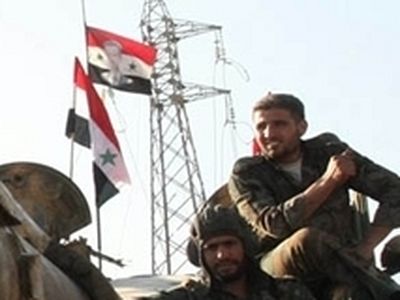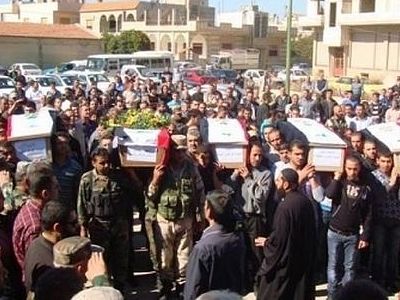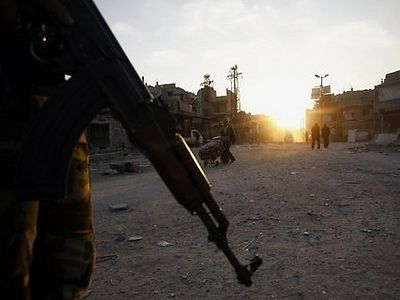In their sketch published on the informational website Calam 1, journalists Tony O’Ryan and Paul Bacile describe the situation in the ancient Christian town of Sadad, recently liberated from the fighters of the so-called, “Syrian Opposition”.
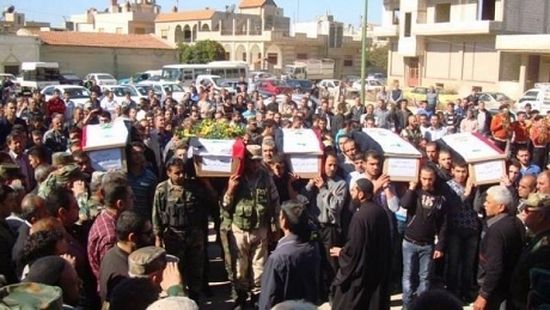 Funeral for those killed by the militants.
Funeral for those killed by the militants.
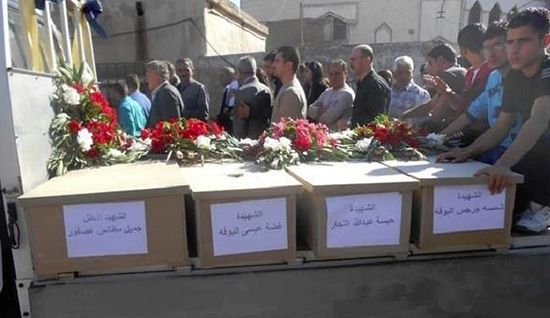 Remains of murdered Christians in Sadad, Syria.
Remains of murdered Christians in Sadad, Syria.
No matter where Al-Qaida goes, it leaves a long, bloody trail of destruction and murder. The Syrian town of Sadad is no exception on the “service list” of Takfiri[1] organizations, which includes terrorist brutalities. The ancient Christian holy sites humbly accepted this cross also—the now common cross of the entire Middle East… We will tell it like it is: The picture before us (and recorded by our camera) was simple horrifying; by its scale and drama it is incomparable to any single tragedy in the Syrian chronicles of recent years.
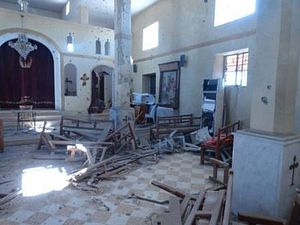 Church destroyed by the opposition in Syria.
Church destroyed by the opposition in Syria.
As the priest stands, hanging his head, we are looking around us. The side altar of St. George was destroyed by a missile, the altar of St. Khoudra is razed to the ground, and the ancient frescoes are mutilated beyond recognition. The destruction to the interior is similar to what you’ll find in other churches in the city.
We go outside of the church, and people immediately approach us. Here is Habsa Halil and her neighbor Abdula, who start emotionally interrupting each other in Syrian, waving their arms. “What is there to say? They bombed our house! They’ve turned our world upside down! For fifteen days now we haven’t even been able to wash our faces!” Now Iusif Halil calls us over asking us to photograph him and the ruins of what was once his home, adding, “Now I and my grandson are out on the street! They fired upon my house and then burned it down using the electrical wiring… I remember, we once got together and asked ourselves, how can we answer these monsters? And I was told, ‘we desire that God would set them on the right path! None of us would wish upon anyone what they have done to us—not even upon them! There…”
A little later we reach one of the few undestroyed houses, where two women are already waiting for us, one of them holding a child in her arms. At our questions about the events that took place in Sadad, the older of the two answers our questions. “They said that they would murder us with knives, that they would destroy everything that belongs to us, that they would level us to the ground—but we did not answer them a thing (and anyway, what could we say to those animals?)… They really did turn the house upside down, destroyed part of our property and stole another part; they also trampled over the icons of our Lord Jesus Christ and the Most Holy Mother of God.”
“I have been married for a year now,” the second woman chimes in. But I and my little girl ran out of the house—you never know what they might do to her! When we returned we saw that the militants had stolen my entire wedding dowry; my wedding dress was smeared with hair cream, and all of my shoes were cut apart and broken… But at least we are still alive—and thank God! God save Bashar al-Assad!”
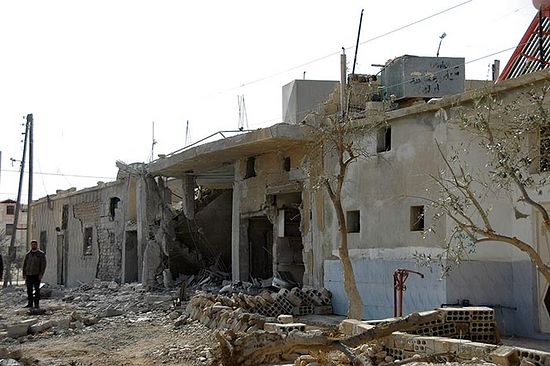 Sadad, Syria.
Sadad, Syria.
The vandals’ destructive hands reached even into the hall of weddings, located not far from the Church of St. Djaris. The Sadad citizens accompanying us showed us the broken furniture and turned-over, empty bottles: Just look at this destruction—there isn’t anything that they did not destroy… Just take a guess at what these “militants of piety and sobriety” are drinking—Lebanese wine, “Almaza”!
Recalling the occupation of Sadad, Fr. Michael had only one word for it: “a nightmare.” “The extremists brought very much damage to the town, they wrecked the fates of many people, and brought many to their death… They threw people out of houses, and if they did not destroy the good, well-built houses they turned them into petty headquarters; furthermore they chose these locations with the calculation that those living next door would serve as something like a living shield. Yes, they gave those families bread, but only so that they would not die and remain as a good cover for those cutthroats who drank alcohol and took all kinds of drugs… The Syrian army freed us pretty quickly, but the entire infrastructure is either damaged or destroyed altogether!”
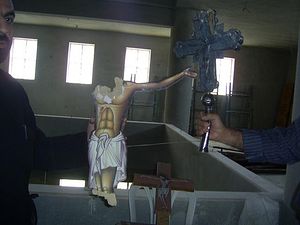
We asked Fr. Michael to address the Takfiri. He answered, “Whoever claims to love the Lord cannot destroy and murder. In the end, no matter what they may do, this country is our country, and we will not abandon it… We built this city ourselves, regardless of the fact that it is so far from the nearest large city; regardless of the fact that it is practically a desert area, we raised these buildings with our own hands, and we will build them again! All Syrians are one people—but the militants are trying to rend this fabric, to weaken it. We will fight!” We involuntarily recalled the stalwart proclamations of the passers-by: “It will all return, God willing! We will stay here! Sadad is the soul of our soul, and we will not abandon it!”
“The Syrians are one people”… Will the Syrians think long about the measures they will take against those animals who have stood in the path of their Fatherland? Most likely not. The burning eyes of Christians and Moslems alike speak of their readiness to act—after all, the Rubicon was crossed…
